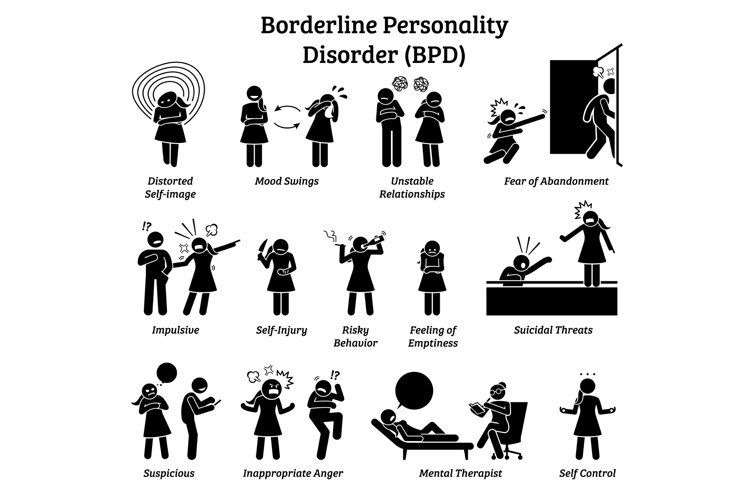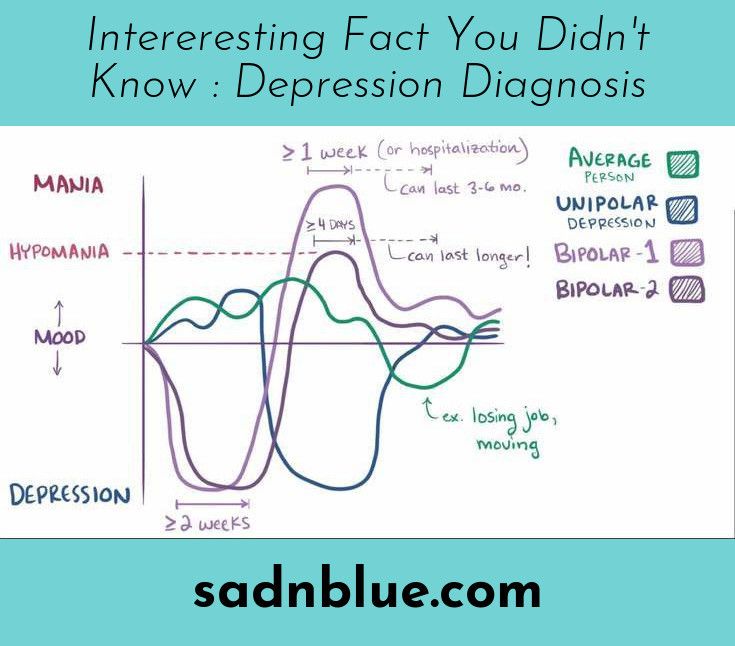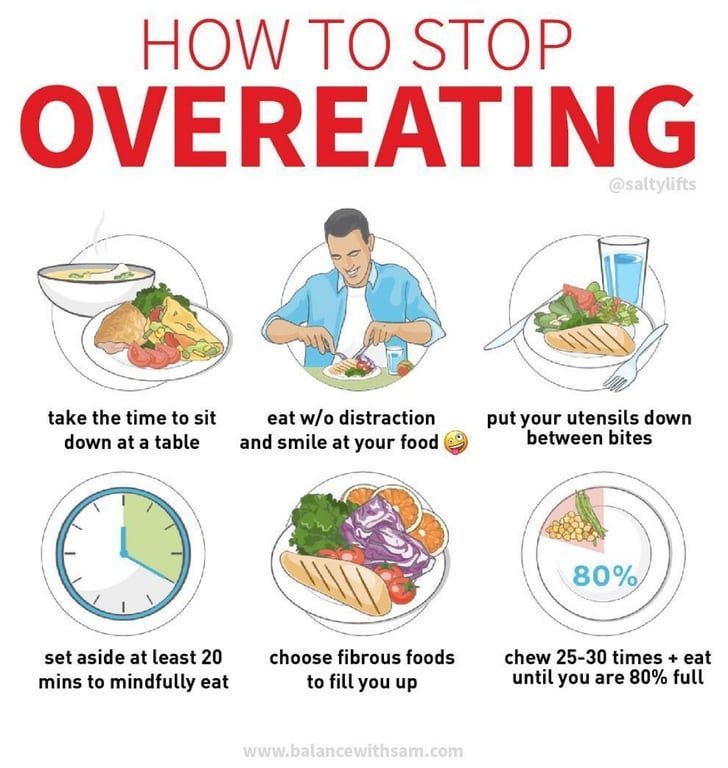Holding grudges in relationships
How Holding Grudges Affect Relationships and Ways to Let Go
In This Article
Did you have a conflict with your partner, and you found it hard to forgive them? Things like this are bound to happen in a relationship because you and your partner are most likely from different backgrounds with different mindsets.
Hence, there is a big tendency for conflicts of interest and disagreements to occur. However, if it amounts to holding grudges in relationships, both parties will start drifting apart.
We’ll be looking at how holding grudges in a relationship can be disadvantageous to both the relationship and your health. It will also be expedient to delve into how to let go of a grudge to get your relationship back on track.
Related Reading: 8 Easy Ways to Resolve Conflict & Improve Marriage Communication
What does grudge mean?
For people who ask, “what is a grudge?”
It is the persistent harboring of resentment and anger towards someone because of what they did. When someone is carrying a grudge, it means that they have bottled that feeling of bitterness for a long time- most times longer than usual.
In a relationship, one party can be found holding onto grudges if they are offended by the other party. This usually happens when the other party has committed an act considered unpardonable.
So, till the matter is resolved, the grudge might linger for a long time as unfinished business.
5 Reasons why people keep grudges in relationships
Do you have an idea why your partner is holding onto resentment? Here are some reasons why people keep holding on to anger and bitterness in their relationships.
Related Reading: 5 Valuable Tips on Managing Anger in Relationships1. Unrealistic expectations
Some people set high standards for their partners in a relationship which is often difficult to meet. When their partners do not deliver as expected, they become disappointed, bitter, and angry.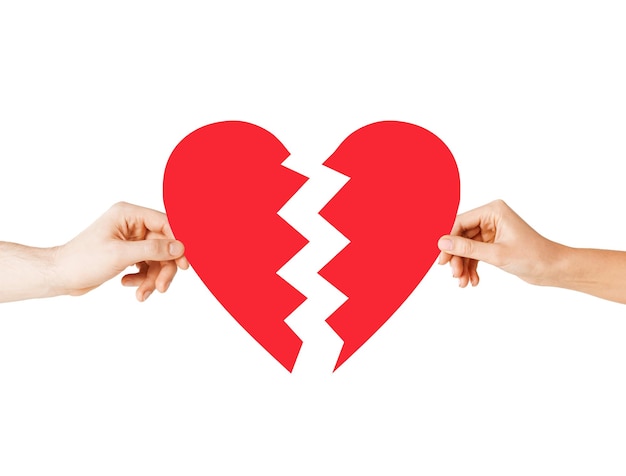 This can set the motion for holding grudges in relationships.
This can set the motion for holding grudges in relationships.
Usually, people who are quite emotionally benevolent are susceptible to such feelings because they don’t receive an equal measure of the love and care they give.
2. Fallouts and assumptionsIn the real sense, a relationship is expected to experience fallouts and misunderstandings so that both parties can pick lessons pertaining to them and become better partners in the relationship. This is the primary reason why partners should be open to settling conflicts to avoid holding grudges in a relationship.
If you are still struggling with how to resolve conflicts in your relationships, you can check out Paul R. Shaffer’s book titled Conflict resolution for couples. His book gives couples insights on how to avoid assumptions, resolve conflicts and get back on track.
If a conflict is unsettled in a relationship, both parties might start holding onto resentment. This act gives room for assumptions which causes further problems in the relationship.
This feeling is a wide category containing various possibilities.
It is possible for someone to feel exploited, used, unloved, ignored, etc. If your partner has various personal activities where they do not carry you along or even give you information, you might feel out and begin to harbor a grudge.
4. Insufficient validationIn a relationship, it is possible for one partner to be big on validation while the other party does not care. For instance, if your partner is going through a difficult time, and you make their situation all about yourself instead of them, they can feel hurt and begin to hold grudges.
It is important for partners in a relationship to be sensitive to the emotions and needs of each other by lending a listening ear and a shoulder to cry on.
Related Reading: How to Save Your Marriage During Difficult Times?5. Unresolved issues
When it comes to settling the conflicts the right way, it involves both parties trying to understand each other’s point without pointing out who wins the argument. If you try to always have your way in every conflict by claiming you are right, there will be various unresolved issues that will affect the relationship.
If you try to always have your way in every conflict by claiming you are right, there will be various unresolved issues that will affect the relationship.
The intention of both parties in a relationship should be to understand each other better so that respect, true love, and security will abound in the relationship. Hence, if you want your partner to stop holding a grudge, it is important to resolve issues amicably by understanding and validating each other’s standpoint.
Also Try: Do You Feel That You Understand Each Other?
How holding grudges can impact your relationship?
Concerning holding grudges in relationships, there are some effects it has on your relationship. If you are not sensitive to them, you will not discover them until the damage results in a far-reaching effect that makes the relationship almost repairable.
Letting go of grudges allows you to focus on other relationships that radiate positive energy, happiness, and satisfaction.
If you are carrying a grudge, here are some reasons not to do so because of your relationship
1. Long-standing anger and bitternessAnger and bitterness are the banes of holding grudges in relationships. And when they continue for a long time, they are also the immediate resultant effect of lack of forgiveness. Both parties are liable to treat each other with disdain and resentment in the absence of love.
With time, they will grow tired of each other and go their separate ways.
2. Inability to enjoy the presentWith persistent holding grudges in a relationship, it would be difficult for you to live in the present and focus on what matters.
The truth is, relationships form the core of our existence as humans, and if you are in a romantic relationship, it might be challenging for you to achieve much if you are holding grudges with your partner.
Related Reading: What Is the Importance of Romance in a Relationship3.
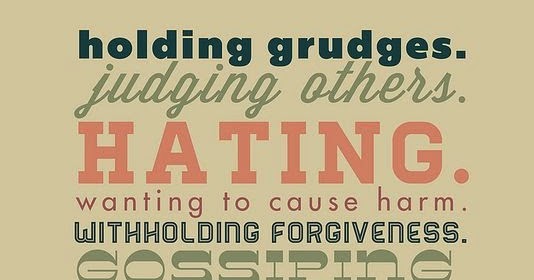 The feeling of a purposeless life
The feeling of a purposeless lifeHolding grudges in a relationship can cause stagnancy even though you feel things are moving forward. This is the point some people get to that they start wondering the purpose of their existence in life so far.
Effects of holding grudges on your health
One of the common effects of holding grudges in relationships is anxiety and depression.
You will be the one suffering from the situation while the other person might be unaware. Holding onto grudges amounts to accumulating lots of negative energy, which affects your relationship with other people. It will be difficult.
In addition to increasing your stress levels, grudges cause other health conditions like post-traumatic stress disorder.
Related Reading: How to Cope With Your Mental Health Issues in a Relationship4 Reasons why it is difficult to forgive
Forgiving someone who has hurt or caused you pain is difficult. This is why some people prefer not to forgive because they feel that those people should have a fair share of what they caused. The inability to forgive someone amounts to holding grudges in relationships, and this is detrimental to both parties.
This is why some people prefer not to forgive because they feel that those people should have a fair share of what they caused. The inability to forgive someone amounts to holding grudges in relationships, and this is detrimental to both parties.
Here are some reasons why it is so hard to forgive
1. You don’t want to be hurt againOne of the primary reasons why you might find it difficult to forgive someone is because you want to avoid being hurt again. It is possible to be in a relationship and avoid forgiving your partner because you are afraid that they will repeat the same act.
Hence, since you don’t want to expose yourself to more hurt, you prefer to hold on to your anger and pain than forgiving them.
2. You feel that they deserve to be punishedWhen you refuse to forgive someone and hold a grudge against them, it could be your way of punishing them. You don’t want them to have it easy because they have caused you pain, and you want to pay them in their coin. Most people use this line of thought to feel powerful after feeling victimized, punished, and hurt.
Most people use this line of thought to feel powerful after feeling victimized, punished, and hurt.
However, it would be fruitless if the other person is not aware because they will move on with their life while you hold on to your grudge.
Related Reading: Help With Forgiveness in Marriage3. You feel misunderstood
If you feel that your partner always misunderstands you, there is a chance that you will find it hard to forgive them. Also, if you are always misunderstood, it means that your partner does not listen to your words, nor do they trust your decision.
So, your most likely line of action would be to hold on to a grudge because they don’t treat you right.
Hence, it doesn’t mean you are voiding your partner, but you prefer to deliberate on issues with them because you are sure they will not listen to you.
4. You are mixing up the concepts of forgiving and forgetting mistakesTo some people, when the idea of forgiveness comes up, they frown at it because they don’t understand the concept. The truth is, it is possible to forgive someone, but it is not possible to forget their mistakes.
The truth is, it is possible to forgive someone, but it is not possible to forget their mistakes.
When it comes to forgiveness, it implies that you let go of any harm or pain they have caused you without seeing the need for revenge.
In addition, forgiveness also means that when you relate with those who hurt you, you don’t treat them based on their past errors. You simply relate with them like you have been on close terms before.
Related Reading: How To Learn to Let Go and Forgive In Your Marriage
6 Steps to letting go of a grudge
In his book, Frank Desiderio highlights some crucial ways on how to let go of grudges and get your life back.
How to deal with someone who holds a grudge against you?
It is expedient to mention that grudge is not a one-off growth; it takes time. If you are thinking of letting go of grudges, here are some steps to help you achieve this.
1. Acknowledge the painOne fact you shouldn’t fail to realize is you were hurt, and that is the primary reason why you are holding grudges.
If you are thinking of how to not hold a grudge, you need to come into the self-actualization that your pain/hurt was real, and you have to deal with it. The act of telling yourself the truth plays a pivotal role in helping your journey to forgiveness easier.
2. Realize that keeping grudges is tantamount to self-harmAnother way on how to get over a grudge is to realize that even though you were incredibly hurt, you are doing yourself a disservice by holding onto it.
There is a chance that the person you are holding a grudge against and holding in anger effects might be living their life to the fullest. They might not be aware that they hurt you until you let them know.
As mentioned earlier in this piece, keeping grudges affects your health. Realizing this gives you the fortitude to start making attempts to let go of grudges.
Related Reading: How to Deal With an Angry Partner3. Recognize that forgiveness is a gift to yourself
When you are taking steps to forgive someone, you need to know that it is a gift to yourself. You will be releasing yourself from every emotional and mental attachment with that person. One way to recognize this emotional and mental attachment is how the rate of your heartbeat increases when you see them.
You will be releasing yourself from every emotional and mental attachment with that person. One way to recognize this emotional and mental attachment is how the rate of your heartbeat increases when you see them.
Hence, to avoid this and other damaging effects, realize that you are doing yourself a favor by forgiving those who hurt you instead of them.
Check out this video that discusses how you can practice forgiveness in the relationship and apply some practical tools to be happy in love:
When issues are not confronted, grudges begin to take form. If you don’t want to take the bold step to forgive, you can consider communicating with them. If it is your partner, you need to communicate to provide proper clarification on any pending situation.
You should also consider if your feelings are worth bottling up or talking about. If they are worth bottling up, you can forgive them silently and move on with your life. However, if you feel you want your partner to learn a lesson or two, you can communicate with them.
If they are worth bottling up, you can forgive them silently and move on with your life. However, if you feel you want your partner to learn a lesson or two, you can communicate with them.
Related Reading: The Importance Of Communication In Marriage5. Stop dwelling on the situation
When you decide to forgive, you need to stop dwelling on the issue responsible for your grudges.
Therefore, you need to keep going forward without looking back. Also, be careful not to think about the situation or discuss it casually with friends. If you keep dwelling on the situation, it will be difficult for you to let go.
6. Stay positiveInstead of not forgiving whoever hurt you, take a cue from that situation that you can always become a better version of yourself by letting go of resentment and anger. It is important to realize that in every negative situation, there is a positive side.
Your fallout with your partner or any of your relationships will teach you crucial lessons to prevent you from getting hurt next time.
This research study by Charlotte vanOyen Witvliet et al. gives a deep study into harboring grudges and forgiveness and how it impacts emotion, physiology, and health.
Related Reading: 5 Life Lessons Betrayal in a Relationship Can Teach YouConclusion
When it comes to holding grudges in relationships, letting go starts with forgiveness. Although, it is unarguable that forgiveness is difficult, especially if it hurts so much. However, to avoid being the one who pays dearly, you need to start practicing how to forgive.
To wrap up, letting go of grudges comes with a truckload of health benefits like reduced blood pressure, enhanced heart health, better mental health, etc.
Here's How Holding Grudges Can Impact Your Relationship, Says An Expert
Dating
by Rachel Shatto
Andrey_Popov/Shutterstock
Have you ever had a fight with your partner you just couldn't forgive? Maybe the issue kept coming up every single time you fought, or perhaps you buried it deep down and kept returning to it because of insecurity or lack of trust. There are several ways holding grudges can impact your relationship, and according to Dr. Gary Brown, a prominent couples' therapist in Los Angeles, a growing number of grudges and resentments can really weaken your bond.
There are several ways holding grudges can impact your relationship, and according to Dr. Gary Brown, a prominent couples' therapist in Los Angeles, a growing number of grudges and resentments can really weaken your bond.
This is true regardless of whether or not you communicate your resentment to your partner, because as Dr. Brown says, a grudge is unresolved hurt and anger that needs to be addressed. "Holding grudges means that there is unfinished business in your relationship," Dr. Brown tells Elite Daily. "Unfinished business is analogous to rust — it slowly eats away at the core of your love." His advice is to try and truly forgive your partner whenever possible. "Sometimes it is relatively easy to do, and sometimes it is difficult," he admits. Brown adds that it's important to not just go through the motions, but to actually put in the work it takes to forgive. "What you don’t want to do is say ‘I forgive you,’ when you really don’t mean it," he says. "This is what I sometimes refer to as ‘false forgiveness. ’ Typically, this means that one of the partners is secretly holding a grudge."
’ Typically, this means that one of the partners is secretly holding a grudge."
The key reason it's important not to hold onto a grudge, says Brown, is that grudges can lead to resentment — a true relationship killer. "When we hold onto a grudge, and depending upon what happened that resulted in you feeling a grudge, is that we tend to feel resentment over time," he shares. And when you hold onto resentment, it can turn into something even more toxic that can really undermine a relationship: Bitterness. "Once you’ve reached the point of bitterness, it is extremely difficult to come back unless you and your partner find a way to work it out," says Dr. Brown.
Grudges can also impact a relationship by eroding the trust between partners, regardless of who is holding onto resentment. "There may not only be resentment by the partner who is holding a grudge, but your partner may also begin to feel a grudge that you aren’t letting go," says Dr. Brown. "It can lead to an impasse that prevents your relationship from growing into something more fulfilling for both of you. "
"
If this is resonating in your relationship, Dr. Brown says the first step in addressing the issue is to do some self-reflection. "One of the first things you need to do is to examine just why you are continuing to hold a grudge. If you felt wronged in some way by something your partner said or did that left you feeling hurt, then it is important that you communicate this to your partner," he advises. That second part may be especially difficult when it's something you've been holding onto for a long time, but Dr. Brown says to truly move forward, you have to be willing to open up. "Secretly holding onto a grudge can seriously hamper your ability to move on. It can leave you feeling stuck," he notes. "Talk to your partner. You need to let them know, even if it was over something relatively small. Otherwise, you could get into the bad habit of holding onto grudges in general."
Holding grudges can, over time, become an unhealthy pattern that extends beyond your relationship.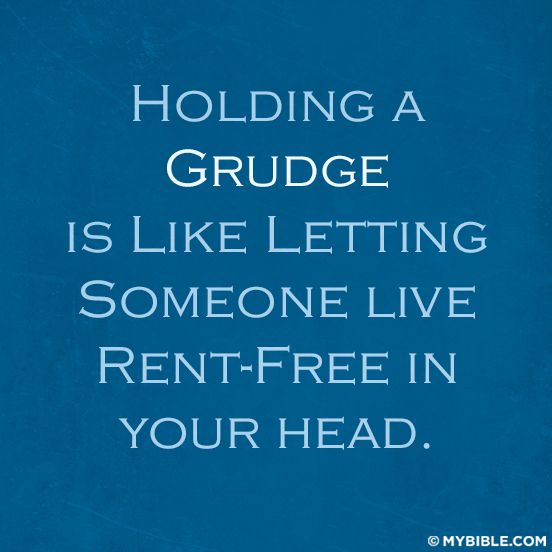 If you sense that it's becoming one in your life, Dr. Brown suggests getting some outside help from a therapist to forge new ways of dealing with resentment or disappointment. You don't have to go it alone. You deserve to be in a happy, healthy relationship, so if you're holding grudges, then getting help might be the first step toward letting go and healing. Making big changes isn't always easy, but you're stronger than you think. You've got this.
If you sense that it's becoming one in your life, Dr. Brown suggests getting some outside help from a therapist to forge new ways of dealing with resentment or disappointment. You don't have to go it alone. You deserve to be in a happy, healthy relationship, so if you're holding grudges, then getting help might be the first step toward letting go and healing. Making big changes isn't always easy, but you're stronger than you think. You've got this.
4 psychological signs of resentment in a relationship
While the essence of resentment may seem as simple as “I’m mad at you because you keep forgetting to throw out the trash,” the psychology of resentment in a relationship is more complex than it might seem at first glance. Feeling resentful is not just about disliking or finding someone annoying; it is a feeling associated with the repetition of painful patterns caused by unresolved issues. Yes, I know it sounds terribly complicated, but it's actually a pretty simple concept when you break it down.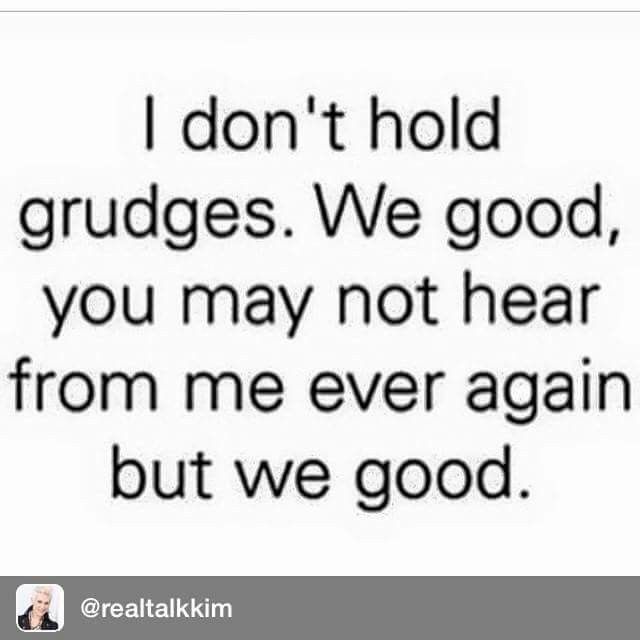 And it’s better to take the time to sort it out, because resentment towards a partner (even if you don’t understand that you feel it) is not the best news for your love life. However, there is good news: your relationship is not doomed if you realize that you have recently felt resentment; you can pay attention to it and deal with that feeling.
And it’s better to take the time to sort it out, because resentment towards a partner (even if you don’t understand that you feel it) is not the best news for your love life. However, there is good news: your relationship is not doomed if you realize that you have recently felt resentment; you can pay attention to it and deal with that feeling.
Resentment in a relationship can appear not only because of some specific details of your everyday worries; it is often related to gender roles and inequality. For example, a famous (and frustrating) 2013 study found that heterosexual men feel subconscious anxiety and resentment when the women they are in a relationship with are doing well, even if they are consciously fine with it. Researchers believe that anxiety may be associated with a socially programmed idea of \u200b\u200bthe male role in family and relationships, even if the man is a staunch feminist. And while the burden of self-sacrifice in balancing relationships and work is no longer solely on women, a 2015 study found that cultural expectations of women in housework and childcare are still high, which may explain the source of resentment in relationships. However, we will soon see that couples can be offended by just about anything.
However, we will soon see that couples can be offended by just about anything.
How do you know you're mad at your partner when you don't pierce a voodoo doll with their name on it every night? Psychological signals of resentment in a relationship can help here. If you are constantly offended for the same reason without dealing with it, there is a good chance that a lot of resentment has accumulated. Read on to see if any of the signals below are familiar to you, learn how to work with them, and forgive the offense.
1. You can't forget a grudge
The concept of resentment in psychology is not a separate feeling, but rather a process of savoring a certain emotion, which does not allow one to somehow solve the problem. Clinical social worker Mark Seichel gave one of the clearest definitions of resentment in Psychology Today.
“Resentment is the mental process of replaying a feeling and the events leading up to it that anger and incite.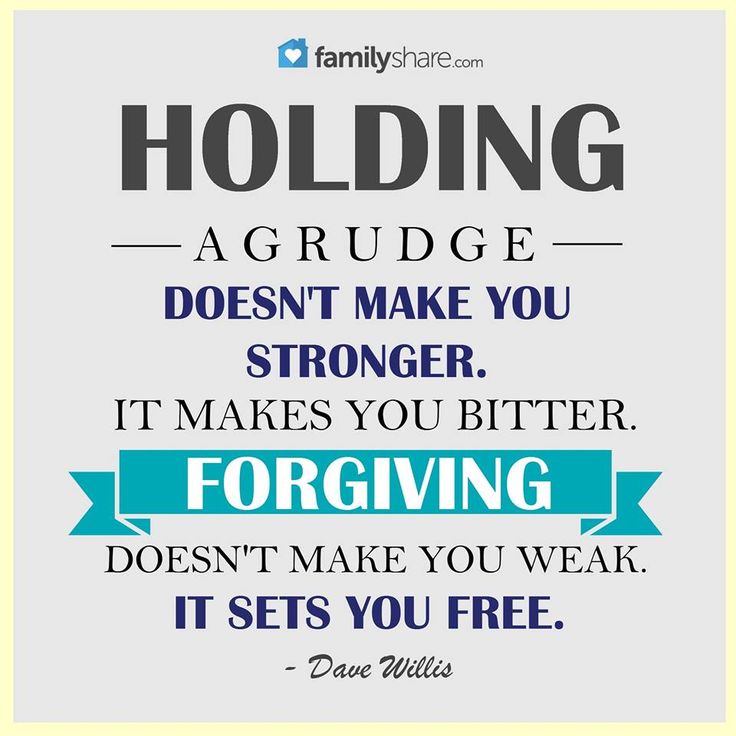 We don't replay a list of cold facts, we re-live them, which has a devastating effect on us emotionally, psychologically and spiritually."
We don't replay a list of cold facts, we re-live them, which has a devastating effect on us emotionally, psychologically and spiritually."
Repeated repetition of anger is a key pattern of resentment, so constantly revisiting annoying or upsetting memories is a sure sign of resentment in a relationship. If you keep coming back to certain events (for example, when you quit your job to move to your partner's city or when he forgot your birthday), you feel resentful.
Resentment is often associated with regret, feeling angry or suffering in response to the belief that something extremely important was not done. If your regrets are related to the decisions you made for the sake of the relationship (for example, "why didn't I take this job in Antarctica when I had the chance?"), those regrets are most likely the root of your resentment.
2. There are hidden subtexts in your conversations
The psychological essence of resentment in a relationship is that it is not "open" or voiced; it is well hidden and hard to see.
In Relationships And Patterns Of Conflict Resolution, a classic for family psychologists, author Dr. Peter Ladd explains that resentment is actually a form of "civilized anger." Just like passive aggression, it hides the power of negative emotions instead of showing them openly.
Ladd also talks about how resentment tends to use withdrawal as a conflict resolution strategy. Conflict resolution strategies are an attempt to describe people's response to a dispute between colleagues and partners. There are four different styles of conflict resolution: competition, cooperation, compromise, withdrawal. People who use the latter are usually passive, unprepared for confrontation, and often dodge or try to avoid resolving the issue. If this description sounds like your way of dealing with relationship problems, resentment can creep in very quickly.
Ladd explains that if both partners in a relationship are trying to avoid conflict, your normal conversations about neutral topics can be filled with resentment. “It allows resentful men and resentful women to let out their frustration and anger without officially declaring that there is a problem.”
“It allows resentful men and resentful women to let out their frustration and anger without officially declaring that there is a problem.”
3. You cannot change the pattern
Guilt and resentment often go hand in hand. Imagine, for example, that one partner earns more than the other. This results in the recipient feeling less resentment and the recipient feeling more guilt. Psychology Today calls it "the dance between resentment and guilt" and says that it's not only common in romantic relationships, but also common among people who care for relatives or take care of children.
Ladd adds that the guilt-resentment interaction can become stronger in a relationship. He gives an example of a pair of an unreliable and reliable partner, when one person is responsible and the other is extremely frivolous. “The guilt of the unreliable partner may feed on the resentment of the reliable partner, and the resentment of the reliable partner may be reinforced by the guilt of the unreliable partner. ” It's a vicious circle where you can argue about the same things over and over (and over).
” It's a vicious circle where you can argue about the same things over and over (and over).
4 Feeling unheard
If you think about it, this makes sense: resentment plays the same problem, because nothing has changed. There was no apology, the accountability structure didn't change, and your partner didn't try to make you feel better (or tried, but it didn't work). So you just go back to the same feeling of anger.
That's why the British Office of Psychological Counseling calls resentment a relationship cancer: if left untreated, it can eat into your relationship until it dies. Mark Seichel identifies three main reasons for resentment: the partner did something bad or thoughtless, the partner did not do something important, or the partner simply does not do “enough”. If you don't deal with resentment in your relationship, things will only get worse.
According to Dr. Oren Emitei, “If the offense and its causes are not dealt with, the offended party will not feel compensated by the partner, especially if the offense was inflicted not on purpose or through misunderstanding, in such cases the offending partner may not even know about it. Lack of compensation increases the feeling of resentment, which in turn feeds the unconscious and conscious desire for retribution.
Lack of compensation increases the feeling of resentment, which in turn feeds the unconscious and conscious desire for retribution.
How to forgive an insult?
Tellingly, the main strategies for overcoming resentment offered by Terry Gaspard of the Huffington Post are to take responsibility for a key problem. In general, both partners should openly discuss the problem and its cause, without denying each other's feelings, be sympathetic, try to forgive the offense and discuss such problems in the future. Psychologists agree that without this, resentment will begin to fester and eventually kill the relationship.
But the good news is that whether you're offended by a cruel comment, a high paycheck, disparity in housework, a lack of sexual interest, or anything else, this problem can be resolved. Dr. Steven Stosney of Psychology Today says the most important thing for a couple is to start talking about it, to replace resentment with compassion and empathy, essential elements of a good relationship.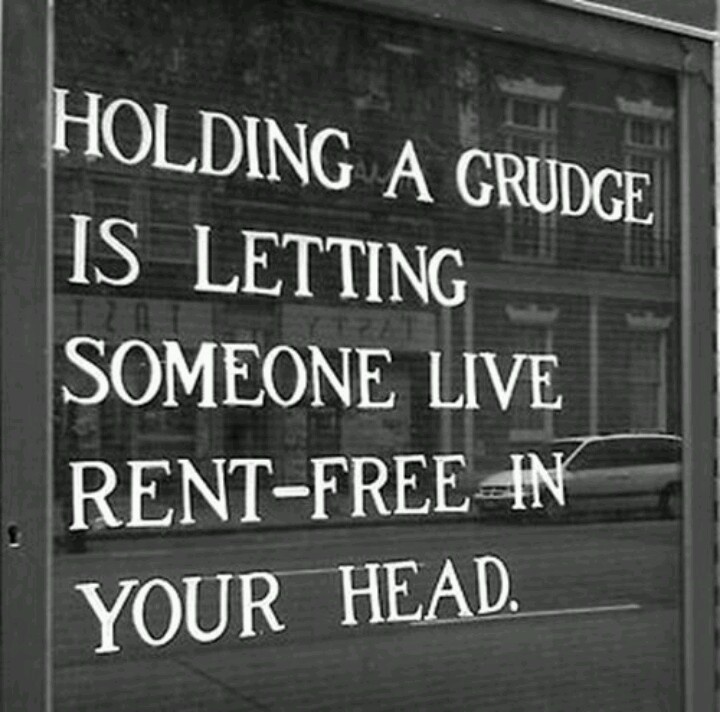 If you are unable to do this on your own, there is no shame in family counseling. Resentment-filled relationships don't heal themselves, but if you're willing to work on it, the prognosis is very good.
If you are unable to do this on your own, there is no shame in family counseling. Resentment-filled relationships don't heal themselves, but if you're willing to work on it, the prognosis is very good.
J. Thorpe
Understanding the causes and consequences of our grievances
How often do you get offended? Do you think you are doing it for nothing? And how often does this happen, because the offense is due to a matter of principle? Today, together we will deal with one of the most difficult, most mysterious and most provocative topics - with Her Majesty Resentment. By tradition, practicing psychologist Vladimir Gambarov will answer our questions.
Resentment is…
- Vladimir, perhaps, everyone had to experience this unpleasant experience. What does it consist of and what is its mechanism?
- If it's very simple, then resentment is born when the other behaves relatively differently from what you expected from him, and sometimes even worse.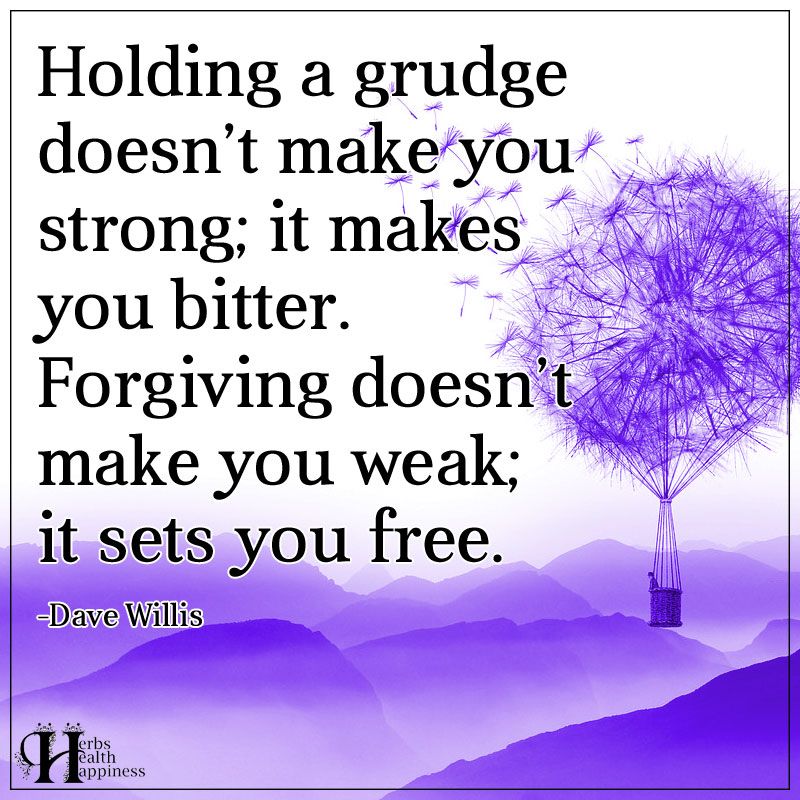 During communication and interaction between opponents, interpersonal relationships always arise, manifest and form, which are accompanied by various feelings. But resentment is one of the most destructive. Hiding deep in her soul, she begins to “eat from the inside”, having a negative impact on psychological and physical health.
During communication and interaction between opponents, interpersonal relationships always arise, manifest and form, which are accompanied by various feelings. But resentment is one of the most destructive. Hiding deep in her soul, she begins to “eat from the inside”, having a negative impact on psychological and physical health.
Resentment is also very closely related to such a concept as justice. We are offended when we think that we have been treated, as it seems to us, unfairly. There are many examples and cases, here is one of many: you wanted your husband to meet you from work, but instead he is watching a live broadcast of a football match. Your expectations are not met, and you have a resentment. In addition, resentment tends to accumulate.
- Is it then possible to say that resentment is bad?
- Resentment is quite multifaceted, and by and large it is neither good nor bad - it is functional. On the one hand, resentment helps to realize the boundaries of oneself and the interlocutor and partly seeks to take a neutral position in which both are beneficial. One is to get rid of the imposed feeling of guilt, the other is to achieve the desired. But various formed stereotypes, concepts, standards, patterns, temperament and characterological features help to jump over this line.
One is to get rid of the imposed feeling of guilt, the other is to achieve the desired. But various formed stereotypes, concepts, standards, patterns, temperament and characterological features help to jump over this line.
Resentment is one of the most destructive feelings. Hiding deep in her soul, she begins to “eat from the inside”, having a negative impact on psychological and physical health.
- How, in your opinion, did the stereotype about stupid female grievances for everything appear?
- The modern world cultivates stereotypes, but also stereotypical forms of behavior.
- So some of us really get offended by everything?
- Everyone is individual, but some people have it. Such a habit acts, one might say, as a mass weapon for the defeat of a man.
- Because of what we are most often offended?
- It happens that for nothing and fictitious expectations. In the end, there are much fewer serious grievances in everyday life. However, there are people who react to minor offenses with outbursts of anger and rage, and thus trigger a mechanism for a serious offense.
However, there are people who react to minor offenses with outbursts of anger and rage, and thus trigger a mechanism for a serious offense.
- How to understand where the insult is another, which we ourselves created, and where is a serious one that needs to be worked on?
- Serious resentment is when the soul hurts, the consequences of it are destructive and lasting. Such resentment can later lead to constant emotional winding up, psychosomatic disorders, and psychological problems. Serious resentment causes internal tension.
Who is to blame and what to do?
- Is it true that the "ability" to be offended is formed in our childhood?
- Yes, in fact, the mechanism of resentment is born in childhood, when parents satisfy the needs of the child. Especially it is formed with various whims. The manipulative model of behavior in childhood makes the child defiantly cry and be offended in order to get what he wants. Sometimes it appears in a hidden form, and sometimes openly. Excessive spoilage, the effect and mechanisms of achieving, obtaining the desired remains in the subconscious of the child and manifests itself in the future in certain situations.
Sometimes it appears in a hidden form, and sometimes openly. Excessive spoilage, the effect and mechanisms of achieving, obtaining the desired remains in the subconscious of the child and manifests itself in the future in certain situations.
- And what is the right way to respond to the insults of the child so that he does not grow up super-sensitive in this regard?
- If parents are constantly looking for reasons to feel sorry for the child, then they will find these reasons and form in the child a feeling of being offended. Let's remember this: “Well, come to me, my little one, and who offended you ... well, don't cry. Often, even if the child himself bumped into something, parents try to scold the inanimate object: “Oh, he is so bad, offended our sun ...”. So it turns out that children already at the age of 2 to 5 years thoroughly learn resentment and use it to their advantage. Look at the child - just because he is not offended, he knows who he is offended by. In children, when offended, “Because” sounds: because he didn’t let me ride, because he didn’t give me a car, etc. And you try to change the concept of relationships for yourself from the answer “Because” to “Why” - why were you offended? In this way, you will distinguish and filter the manipulations of the child.
In children, when offended, “Because” sounds: because he didn’t let me ride, because he didn’t give me a car, etc. And you try to change the concept of relationships for yourself from the answer “Because” to “Why” - why were you offended? In this way, you will distinguish and filter the manipulations of the child.
- You said that a serious offense can destroy from the inside. And how else does a feeling affect if it sits in us for a long time?
- Yes, resentment can destroy, lead to psychological disorders. Also, a person can hatch a plan of revenge and retribution for years, and his own life will pass by. In general, long-term grievances form irritability, dissatisfaction with life, the emergence of negative feelings, thoughts, which again corrode the personality.
- Which is better - to hush up an insult, pretending that nothing is happening, or to pronounce it?
- If you want to clarify the situation, then you will have to express your negative feelings. To hush up is to hush up. But it is better to understand a person before being offended. Maybe it’s not about you at all, but about the life difficulties of your offender, which is why he has such behavior.
To hush up is to hush up. But it is better to understand a person before being offended. Maybe it’s not about you at all, but about the life difficulties of your offender, which is why he has such behavior.
In children, when offended, it sounds “because”: because he didn’t let me ride, because he didn’t give me a car, etc. Try to change the concept of relationship for yourself from the answer “Because” to “Why” - why are you offended?
- How to get rid of this feeling?
- In order to understand how to get rid of resentment, you need to understand the root causes again. Take control of your own emotions, increase self-esteem and confidence in your abilities, realize yourself as an individual person. Accept what happened as an experience.
If you were offended by a stranger with whom you will never meet again, you should not keep the offense in yourself, forget about it, because nothing unites you with this person. If you were offended by a person close to you or a relative, then you obviously cannot do without a frank and constructive conversation. However, such a conversation should be conducted only when you have already cooled down and brought the emotional level back to normal.
However, such a conversation should be conducted only when you have already cooled down and brought the emotional level back to normal.
- What should you do if you know that you were offended on purpose?
- Look at the situation with an adult constructive look - you are no longer a child to cry and pout. Refocus your attention on other aspects of life that are more important and significant.
- Is it possible to "train" your non-offensiveness?
- Yes, there would be only a desire and desire for self-development. Resentment is an unborn feeling, so you can.
You need to talk about your experiences. It is better to understand a person before being offended. Maybe it's not about you at all, but about the life difficulties of your offender, that's why he has such behavior?
Danger of offenses
- They say, "in order not to be disappointed, do not be fascinated." But how to follow this advice in practice? After all, most often we are offended by someone because of our unjustified expectations.
- Take off your rose-colored glasses, develop self-control. Do not put on a pedestal, do not make a deity out of a person. Look realistically at things, less fantasy and imagination, rely on yourself and your strengths. Don't wait or demand.
- There is an opinion that some people like to be a victim. What do you say to that?
- Yes, it happens. And in order to get out of the role of a victim, you need to take responsibility for your life and develop independence. Naturally, this is work on oneself, and not one day. It is necessary to change the way of thinking, if it is not possible on your own - contact a specialist. First, learn to say "no". Set boundaries for yourself and your partner.
- You already said above that we can accumulate insults, and then “explode”. But sometimes we immediately become aggressive and begin to offend in response. Why? - Sometimes it is difficult for many people to discuss their feelings. Sometimes people can't even say tactfully that something made them upset or uncomfortable. Such understatements, misunderstandings, ambiguities accumulate, which subsequently causes anger or a surge of emotions. But as for the speed of reaction, it, of course, depends on the temperament and character of the person himself, his psychological processes.
Sometimes people can't even say tactfully that something made them upset or uncomfortable. Such understatements, misunderstandings, ambiguities accumulate, which subsequently causes anger or a surge of emotions. But as for the speed of reaction, it, of course, depends on the temperament and character of the person himself, his psychological processes.
- Let's return to the "stupid women's insults." How to properly talk with a person about your grievances, so as not to get a stereotypical answer and convey your pain.
- I will repeat that in no case can grievances be hushed up, they need to be talked about, and sometimes it is even difficult. Remember that you must be completely honest. Reinforce the whole conversation with the fact that you love the person sincerely. Don't turn the conversation into hurting each other again. Speak in turn, do not let us close. Respect yourself and the interlocutor. And first, mentally say what offends you in this case.
Choose a place and situation for such a conversation. Consider psychological characteristics, temperament and character. Don't forget to say thank you and collect as many small "yes" as you can throughout the conversation. And another note: resentment is insidious in that it overshadows logic. Consider this.
- Everyone reacts differently to insults. Some admit mistakes, others share responsibility and come to a common solution, while still others do not want any dialogue, and the relationship is broken. How to treat your grievances reasonably?
- Remember that if you are offended, then you have agreed to this. Admit that you feel pain, but, once again - do not drive yourself into the role of a victim! Do not scroll and do not wind the situation in your head. Practice positive self-hypnosis and autogenic training (other relaxation techniques). Activity will serve as the most effective and free medicine for you.
Rules for dealing with offense
• Analyze the hurt, get a clear picture. • Make a firm decision to forgive. • Tactfully put the offender in his place. • Watch your emotions. • Be aware of your safety. • Turn the situation into another learning experience.
• Make a firm decision to forgive. • Tactfully put the offender in his place. • Watch your emotions. • Be aware of your safety. • Turn the situation into another learning experience.
"He's just silent"
"Vladimir, hello! We have a difficult situation with a young man, because of which my grievances periodically break out and provoke other minor grievances. I can't explain everything to you. As a result, I try to discuss my feelings with him, but he is silent. Says I'm attacking and closes. And so it always is: just a little, he just keeps silent. Sometimes I feel like he's doing the right thing. I cool down and everything is fine. But it is important for me to hear answers to some of my questions. Because of the understatement, sediment after sediment builds up inside, and it seems that one day I just might explode. What to do?"
Alexandra, 31 years old
- Hello. One of the main reasons for such behavior of a young person is the fear of taking responsibility.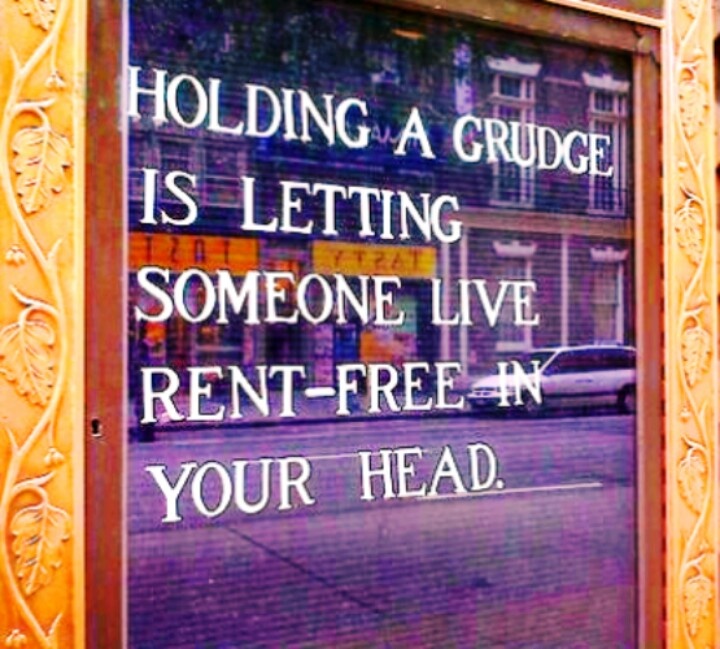 This is the principle of the turtle - to hide in the shell, if it's scary. Very often in consultations, one of the partners says that when he wanted to speak out, the other was very angry. This also finds confirmation in your words: I am cooling down and everything is fine ... "," He says that I am attacking ... ". Change the tactics and style of your conversation, start with the phrases: "I know that you have your own good reasons not to talk about it ... however ...". It is also shameful to feel shame, do not try to forcibly bring to clean water without an inner desire from the interlocutor.
This is the principle of the turtle - to hide in the shell, if it's scary. Very often in consultations, one of the partners says that when he wanted to speak out, the other was very angry. This also finds confirmation in your words: I am cooling down and everything is fine ... "," He says that I am attacking ... ". Change the tactics and style of your conversation, start with the phrases: "I know that you have your own good reasons not to talk about it ... however ...". It is also shameful to feel shame, do not try to forcibly bring to clean water without an inner desire from the interlocutor.
“My girlfriend is a feminist. And I don't understand her"
- When we quarrel with my girlfriend, I always try to put myself in her place and understand. It seems to me that she got so used to my gentleness that she began to take it for weakness and abuse my feelings. So, every time she says that I think her grievances are stupid (although they are not!), Because she is a woman. She talks about oppression, some male stereotypes and so on (she is a feminist). Sometimes I talk about it and “get it on the head”: here, I told you, you devalue my insults! Very tired, but I love her.”
She talks about oppression, some male stereotypes and so on (she is a feminist). Sometimes I talk about it and “get it on the head”: here, I told you, you devalue my insults! Very tired, but I love her.”
Roman, 35 years old
- Hello. I would call your case “inverted resentment” - the most common way of manipulative resentment. Try to refrain from playing along, but don't be harsh. Maintain clarity of thought, accuracy of utterance, and keep emotional balance. Techniques and various ways to resist female manipulation can be found on the topic: "Women's manipulation".
"I can't forgive my mother"
"Hello. My resentment has been going on for many years. I cannot forgive my mother. The fact is that she left us with her father when I was still small. It's a very long story. Before, when I played everything in my head or told someone, I always cried, and then it became easier. Then came indifference. And now periodically severe pain and anger. I don't understand why she did this to us. But this feeling is eating me up inside. I would rather forgive, but how?”
I don't understand why she did this to us. But this feeling is eating me up inside. I would rather forgive, but how?”
Ayuna, 47 years old
- Hello. “I can’t forgive my mother ..” - understand that you need this forgiveness to a greater extent, and not your mother. By not letting go of the situation, you thereby destroy your life (“But this feeling is eating me up from the inside ...”). Why can't you forgive? Because you are trying to remove the blame from the guilty person, but you need to forgive and let go of your anger at the suffering that your mother caused you. Of course, I have a lot of counter questions to your question: “How did your life turn out and who played a big role in it? Is your mother to blame for the way your life turned out in general? What are the values in your life? How would your life have turned out if your mother had not left you, etc. Loves you, she never learned, are you ways to be stronger and above all this, or are you gnawed by fear? You decide.
